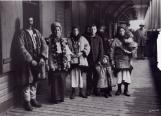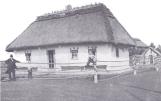1
Anna Wasylyna tells why and how she immigrated to Canada and about her first years in a new country.2
I was born in the small town of Kizliv in Ternopil Region. My maiden name was Anna Toporovska. My parents were peasants - they owned a farm on which they kept horses, cows and barnyard fowl. There were five of us children. My father died when I was six and my mother married a second time.My mother and stepfather decided to go to Canada, but they were unable to sell all their property because they held title to only three morgs of land (a "morg" was equivalent to approximately one acre), while the rest belonged to us children who had been orphaned. Since we were still minors, this remaining property could not be sold. My parents were forced to lease this land for a period of twelve
years. As a consequence of World War I, the property was lost and we got nothing for it.
I had completed four years of grade school before we left for Canada and was eleven years old at the time. Our large family (my parents and eight of us children - three more children had been born in the second marriage) came to Canada in 1912.
We came to the small farming town of Arborg in Northern Manitoba. We were dreadfully poor. I was hired to look after a baby and was paid four dollars a month. My parents used some of that money to buy a 98-pound sac of "Four X" flour which cost $2.75. And so we had something with which to feed the small children.
We and another family lived together in a small two-roomed shack: we occupied one room and they had the other room. My father was unable to find work at first. Only my older brother earned some money cutting wood in a nearby bush and then selling it in town. That was the only income that our family had. When spring came, my father went to look for work elsewhere.
We lived in Arborg in such difficult circumstances for two years. After that, we rented a farm in Crossburg, about twenty miles from Arborg. There were no roads and there was mud everywhere. The swarms of mosquitoes were so thick in the summer that we couldn't manage without a smudge to protect ourselves from them.
Only a small part of the farm was under cultivation. Actually, all we had was a small garden. My father went to work away from home while the rest of us worked for better-off farmers. One of my sisters, who had been looking after some people's children for about four months, had earned thirty dollars. She carried the money in her glove when she brought it home. My mother bought a cow with that money so as to provide the smaller children with milk. It was in this way that we helped one another during those difficult times.
When I was fourteen, I went to Winnipeg in search of work. I worked as a domestic in the home of some rich people - it was a Jewish family. I had to get up very early, clean the house, heat the water, take the baby out in a carriage for some fresh air, wash the dishes after dinner and after supper, scrub the floor, and so on. My working day began at seven in the morning and ended at ten at night. I had no day off, with the exception of Sunday, when I was given two to three hours in order to go to church. After church, I had to return to work at once. I was paid seven dollars a month for the work I did.
When I was fifteen, I went to work in a laundry. This was better work. I sorted bed sheets and packed them in bundles of ten into boxes. I knew English somewhat better than the older immigrant women and so often acted as interpreter between them and the foreman. Sometimes I found it very unpleasant as I was ashamed to do the translating whenever the foreman reproached the older workers or scolded them or, in some cases, fired them. I tried as best as I could to somehow tone down the coarse rude language used by the foreman as I translated from English into Ukrainian so as not to insult the older women whom I respected highly. I was still a child at the time. In those days we had no trade union. Sometimes we were asked to work ten or fifteen minutes more without extra pay. There were fifty of us who worked there.
I shared a room with my cousin, Mary Dandevich. In this same house lived Timothy Koreychuk who was already a recognized leader in the Ukrainian Social Democratic Party and an active worker in the Vynnychenko Theatrical Association. He used to speak to us about the activities of this dramatic group. And so it was that he invited me to come to the Association which was located on
Main Street. I was seventeen years of age at the time. The Association didn't have many members so we had to play two different roles in the same production. At first, we put on one-act plays in the Royal Theatre.
ANNA WASYLYNA
WINNIPEG, MANITOBA
interview by Peter Krawchuk

